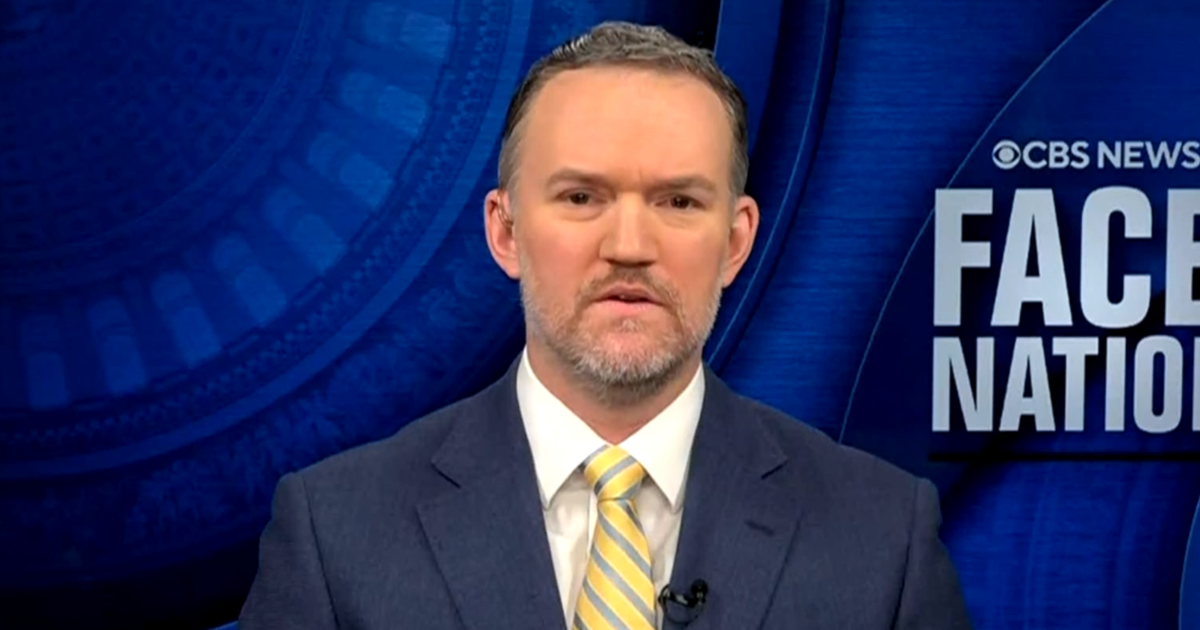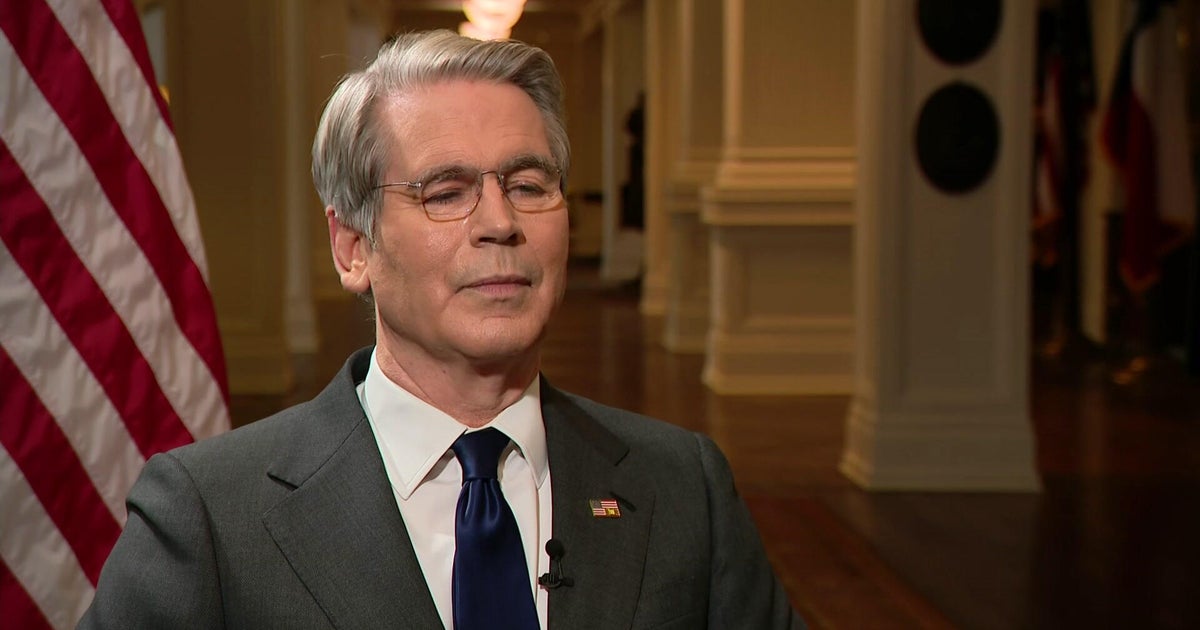Transcript: Scott Gottlieb discusses coronavirus on "Face the Nation," November 22, 2020
The following is a transcript of an interview with former FDA Commissioner Scott Gottlieb that aired November 22, 2020, on "Face the Nation."
MARGARET BRENNAN: We go now to former FDA commissioner, Dr. Scott Gottlieb, who joins us from Westport, Connecticut. Dr. Gottlieb is a board member at Pfizer, which has just applied for FDA emergency approval of its vaccine. Good morning to you.
DR. SCOTT GOTTLIEB: Good morning.
MARGARET BRENNAN: Let's start on that vaccine. You heard Dr. Fauci say life probably won't go back to normal in May, but he did seem to agree with the timeline that around that time frame, that's when the vaccine will be widely available. What do you know about that distribution plan?
DR. GOTTLIEB: Well, look, the supply is going to be limited in 2020. As we get into 2021, they'll be much more supply. And I think by the second quarter of 2021, maybe into the third quarter, we'll have a vaccine that hopefully will be licensed for general use if everything goes well and the data continues to support the safety and effectiveness of that vaccine. And we'll be able to vaccinate the public or a good portion of the public heading into the fall of 2021. I think 2021 is going to be a much different year with COVID with the combination of the vaccine and other therapeutics, the therapeutic antibodies that will be in wider supply in 2021. What we really need to get through is the next two or three months. And what I would say to the American people is there's light at the end of the tunnel right now. Try not to be the person who gets infected in the last two or three months of the acute phase of this pandemic. We protected ourselves for nine months. We have two or three months to go before we have technological solutions that are going to dramatically lower the risk. We need to just get through a very difficult period right now.
MARGARET BRENNAN: Just to clarify your timeline, when you're talking about second or third quarter, you're saying it's really not until April, May, June, maybe later that your average healthy person can go get a shot in the arm? Correct?
DR. GOTTLIEB I think that's- I think that's probably right, the emergency use authorization will be for a limited population this winter. I think what will happen is the companies are likely to file amendments to expand the eligible population as supply expands. So think of the initial population maybe being elderly people who are in institutional settings like nursing homes or long-term care facilities. Then you expand it maybe to elderly people who might be living at home, and then you start expanding it down the age cohorts. So you basically walk it down the risk-benefit continuum. But the point at which it's going to be broadly licensed for that healthy 30-year-old, that's probably second quarter of 2021, maybe early third quarter if things go well. But that's okay because we're likely to have a quiescent spring and summer because we're going to be getting off a very dense epidemic this winter. And what you really want is a vaccine broadly available in time for the fall COVID season. Also, remember, we don't need to vaccinate 70% of the public because by the time we get through this winter, probably 30% of the public will have had COVID. So they'll have some natural immunity. So what you need to do is get some percentage of the people who haven't already had the infection vaccinated and ideally some of the people who have had the infection to basically double down on their immunity.
MARGARET BRENNAN: Do you know if there are adverse reactions to the vaccine? And once you get it, will you have to go back and get it every single year?
DR. GOTTLIEB: We don't know yet. I think initially it's probably going to be given on a general schedule until we learn more about the real-world benefits of the vaccine and how much it cuts down on transmission of the virus. You know, does it just prevent you from getting COVID symptoms or does it actually prevent you from getting the infection and spreading the infection? That's one of the things we're going to need to determine about the vaccine and how long the immunity is. There is some data that suggests the immunity is fairly durable. It might last longer than a year, but we just don't know that yet. And we're not going to know it probably at the time that this gets authorized. So, my guess is it's going to be an annual vaccination for a period of time until we learn more. As far as the safety profile, the safety profile has been good in the clinical trials. Most adverse events related to vaccines happen within the first 40 days or first two months of vaccination. But we're not going to know the full profile until you have that long term follow up data. And that's why the FDA is taking a prudent approach here. And they're not going to probably generally license this vaccine until they have six or eight months of long term follow-up data on the patients who have been vaccinated in the trial, as well as those that they follow who get vaccinated now over the course of the next several months.
MARGARET BRENNAN: Key point for those who hear this may be available next month, it won't actually be widely available for some time. I want to play for you something President Trump said from the White House podium on Friday. And I'd like to get your reaction.
[BEGIN CLIP]
PRESIDENT DONALD TRUMP: You wouldn't have a vaccine if it weren't for me for another four years, because FDA would have never been able to do what they did, what I forced them to do.
[END CLIP]
MARGARET BRENNAN: Is that true?
DR. GOTTLIEB: Well, look, I think the FDA moved with a lot of speed here. And they worked very closely with the manufacturers. I have no indication that the White House forced them to do that. I think this was the public health mindedness of that agency in recognizing the urgency. I know they engaged very closely with the manufacturers, including Pfizer, which I'm on the board of, as you mentioned, and that certainly helped accelerate these development programs. I don't think anybody was forced to do anything here. I think everyone worked together very hard in collaboration. This was an unprecedented collaboration between the government and private industry because everyone recognized the urgency.
MARGARET BRENNAN: Just back to your broader point, because Dr.- what Dr. Fauci was saying carefully, he was clearly issuing a warning of what we need to prepare for over the next few weeks. We've talked a lot about progress that has been made in medical research and therapeutics and vaccines. But at what point does that progress get just overwhelmed by the infection rate? I mean, do we- do we wipe out that progress just because it's so widespread?
DR. GOTTLIEB: Well, the problem is that the progress isn't going to be widely accessible over the course of time that we- we're going to be getting through the acute phase of this pandemic and really the worst phase of this pandemic. What's going to happen over the next four or six weeks is largely baked in. And the spread is going to be so diffuse around the country that the federal government's not going to be able to backstop local regions who are going to be facing very unprecedented situations. You know, there will be therapeutics available and vaccination available probably to help on the tail end of what we're going to go through. But we're going to have to go through this the old-fashioned way. We're going to have to, you know, hunker down, reduce our interactions, wear masks more aggressively, higher quality masks. Right now, to contextualize this for the individual, the prevalence is about 1.5%. That means if you- if you're in a restaurant with 50 people, there's a 50% chance nationally that someone has COVID in that restaurant. In North Dakota, where infection rates are higher, if you're in a group of 10 people, there's a 50% chance that someone in that group of 10 people has COVID. That's the kind of risk we're facing individually right now. And that's only going to get worse.
MARGARET BRENNAN: You're saying hospitals are going to get overwhelmed?
DR. GOTTLIEB: Hospitals have a lot of ability to create new beds. They- they have figured out how to surge capacity. Where they're going to get overwhelmed, where they're going to get stretched is on personnel. What we were able to do during this spring wave and then again the wave in the summer was surge health care personnel into those regions to backstop the hospitals,--
MARGARET BRENNAN: Yes.
DR. GOTTLIEB: --to allow them to create new beds. So the hospitals can create new beds, they just won't have the people to staff them.
MARGARET BRENNAN: Dr. Gottlieb, thank you for your analysis. We'll be right back.



